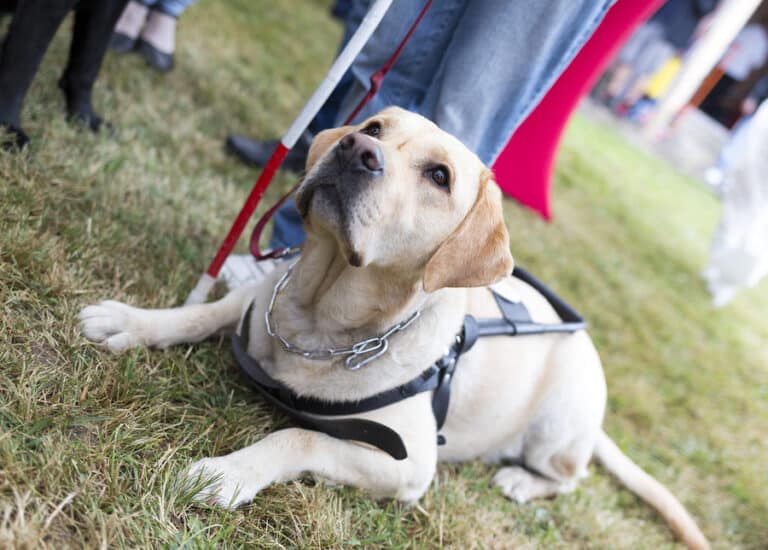There’s no question that dogs make life better.
Their wiggly tails and lolling tongues make us smile. Stroking their soft fur is comforting. Their unconditional love makes us feel wanted and offers companionship. But, can they help your aging relative to better manage diabetes? The answer to that, say researchers at the University of Bristol in the United Kingdom, is yes.

Dogs and Diabetes Research
Dogs can be trained to help people in all sorts of ways. They can be trained to assist blind people to navigate the world, alert the hearing impaired to alarms and other sounds, and support people with mobility issues. They can also be trained to alert people to potential medical emergencies, like hypoglycemia in diabetes patients. However, the researchers wondered how accurate their detection skills were.
The researchers worked with a charity organization called Medical Detection Dogs. Participants in the study had dogs who were trained and certified by Medical Detection Dogs to alert them to low blood sugar, or hypoglycemia. The scientists examined 12 weeks of information concerning blood samples and incidences when the dogs alerted their owners. They found that the dogs were accurate 83 percent of the time.
Hypoglycemia Symptoms
Not everyone has or wants a dog trained for medical detection, but that doesn’t mean you can’t prevent severe cases of hypoglycemia. Knowing the symptoms is the first step. The symptoms of hypoglycemia are:
- Irregular heartbeat.
- Fatigue.
- Skin that appears pale.
- Feeling shaky.
- Hunger.
- Sweating.
- Irritability.
- Feeling tingly around the mouth.
- Calling out while sleeping.
- When hypoglycemia gets severe, symptoms may include:
- Confusion.
- Blurry vision or other vision problems.
- Seizures.
- Losing consciousness.
- Seeming intoxicated.
- What to Do
When hypoglycemia occurs, doctors at the Mayo Clinic recommend that the older adult consumes 15 to 20 grams of a fast-acting carbohydrate, such as a glucose tablet, juice, or a regular soft drink.
Then, recheck blood sugar levels after 15 minutes. Repeat the steps if blood sugar hasn’t returned to normal. When blood sugar comes back up, the older adult should have a snack or small meal to stabilize their blood sugar levels.
Home care can watch for signs of hypoglycemia in your aging relative when you cannot be there. Home care providers can remind the senior to check their blood sugar and take diabetes medications to better control their condition. And, if hypoglycemia occurs, a home care provider can assist the older adult to take the necessary steps to return blood sugar levels to a safe range. Should the senior need emergency medical treatment, a home care provider can call help.
If you or an aging loved one is considering Elderly Care in Lorton, VA, please contact the caring staff at Access Home Care Inc. Proudly Serving Northern Virginia and Surroundings for over 12 years.
Call Us: (703) 765-9350
Sources
https://www.medicalnewstoday.com/
“My desire to enter into nursing started when one of my older sisters died of kidney disease due to lack of care. At age 15, I decided to enter into nursing so that I could provide quality care to patients.Upon arrival in United States at 21 years of age, I enrolled in T.C Willliams School of Practical Nursing while working as a nursing assistant at a nursing home. I also worked as a part-time home health aide to take of the elderly. After completion of my practical nurse education, I worked in geriatric psychiatry unit at Dominion Hospital and Arlington Correctional facility mental health unit.
I completed Marymount University in 2001 and entered into Home Care as a field case manager.
I held that position for 2 years and as an Administrator, and for another 2 years until Access Home Care was found in 2004."
Today, Access Home Care has over 300 employees and 286 clients.
- Personal Care at Home Helps Seniors Stuck at Home Connect With Others - April 17, 2025
- Five Tips for Living with Chronic Lower Back Pain - April 3, 2025
- How 24-Hour Home Care Is Different From Other Types Of Care - March 19, 2025



